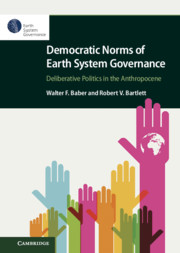Book contents
- Democratic Norms of Earth System Governance
- Democratic Norms of Earth System Governance
- Copyright page
- Contents
- Table
- Acknowledgments
- 1 Democratic Governance in the Anthropocene
- 2 Toward Consensual Earth System Governance
- 3 Empowered Democratic Agency in the Anthropocene
- 4 Embedded Governance Architecture in the Anthropocene
- 5 Experimental Adaptiveness in the Anthropocene
- 6 Equivocal Democratic Accountability in the Anthropocene
- 7 Equitable Access and Allocation in the Anthropocene
- 8 Earth System Democracy
- Afterword
- Notes
- Bibliography
- Index
7 - Equitable Access and Allocation in the Anthropocene
Reconciling Today and Tomorrow
Published online by Cambridge University Press: 12 August 2021
- Democratic Norms of Earth System Governance
- Democratic Norms of Earth System Governance
- Copyright page
- Contents
- Table
- Acknowledgments
- 1 Democratic Governance in the Anthropocene
- 2 Toward Consensual Earth System Governance
- 3 Empowered Democratic Agency in the Anthropocene
- 4 Embedded Governance Architecture in the Anthropocene
- 5 Experimental Adaptiveness in the Anthropocene
- 6 Equivocal Democratic Accountability in the Anthropocene
- 7 Equitable Access and Allocation in the Anthropocene
- 8 Earth System Democracy
- Afterword
- Notes
- Bibliography
- Index
Summary
Access and allocation firmly ground the concept of human security in the larger context of social justice, posing serious challenges for equitable earth system governance.The focus on capabilities brings together a range of ideas addressed inadequately in traditional approaches to the economics of welfare. The capabilities approach highlights the importance of real freedoms in the assessment of persons’ relative level of advantage, promoting a more realistic balance of materialistic and non-materialistic factors in evaluating human welfare and a concern for the distribution of substantive opportunities within society.Research on access to and allocation of environmental resources in a deliberative system of democratic governance builds on and extends an existing limited research literature on the implications of deliberative democratic practices for environmental justice policy and governance.More equitable access to and allocation of environmental “goods” should be a focus for a next generation of environmental research characterized by improved normative understanding as well as more meaningful and reflexive potential for sustainability transformation.
- Type
- Chapter
- Information
- Democratic Norms of Earth System GovernanceDeliberative Politics in the Anthropocene, pp. 138 - 151Publisher: Cambridge University PressPrint publication year: 2021

